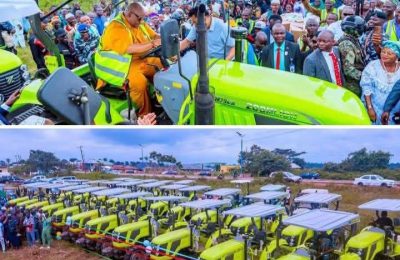

For decades, African countries have sought foreign capital to help bolster their industries and boost their abilities. But too often, those investments have not benefitted the people of Africa. Now, as wealthy nations once again eye the natural of the African continent, N.J. Ayuk, Executive Chairman of the African Energy Chamber, wants to ensure that new deals spread the wealth more fairly.
“Huge investments are coming in, but these investments have to also have a role to play helping our issues that have to deal with energy poverty and also energy growth within the continent,” he said. “If all the investments and all the energy projects in the continent are only going to be about taking oil or natural gas or green hydrogen exported outside of Africa, then these investments would not necessarily have good impact on everyday people.”

Since the War in Ukraine started, many European countries have sought to end their practice of buying natural gas from Russia. The search for other sources of fossil fuels has revived interest in previously abandoned projects in Africa and injected fresh interest in previously undeveloped avenues.
Renewed interest in the African energy sector is an immense opportunity to not only provide income to some of the world’s poorest countries, but also to help kick-start a wave of economic growth by reducing energy poverty and providing a range of jobs for African people, Ayuk said.
The African people are not eager to repeat the investment mistakes of years past. If new energy deals cannot produce results for everyday Africans, “You’re going to see a backlash from the communities, because they want to see change,” Ayuk said. “They want to ensure that no matter what you’re doing with energy, it is helping, and it is alleviating some of their key concerns, their key problems. That is important.”
How Energy Projects Can Help
Ayuk, who founded the pan-African firm Centurion Law Group, has spent his career focused on the African energy sector.
In his eyes, it’s crucial for all foreign investors to understand the need to build a functional energy grid for Africans—many of whom live with no access to electricity or deal with daily blackout—as part of any new deal that siphons away the continent’s natural resources.
With the renewed interest shown by many American and European companies, this is the perfect time to insist on attaching requirements to contracts that will improve the countries and regions where fossil fuels are being extracted, N.J. Ayuk said.
“I think we’re going to see a lot more investment. Investment is going to grow in the continent in 2024,” he said. “You might going to see a rebirth of the $20 billion Mozambique LNG (Liquefied Natural Gas). That’s going to happen with TotalEnergies out of France. And you’re going to see a lot more exploration that will come from big U.S. companies, like ExxonMobil and Chevron.”
The Mozambique LNG project is a good example. The project was expected to produce 43 million tons of natural gas per year, but was shut down in 2021 after terrorist attacks killed civilians in the region. As part of its restart, TotalEnergies has committed to a plan to help locals beyond simply supplying jobs. Among the actions it will take are paying displaced families and providing newly built houses, improving access to fishing, and establishing a foundation to improve local life that will have a $200 million budget.
For N.J. Ayuk, that’s only the start. As outlined in his book, “A Just Transition: Making Energy Poverty History with an Energy Mix,” the goal of all new contracts in the energy industry should be to reverse the decades of exploitation that have gone before. He wants to bring more energy to more people, all across the continent—and not just from projects that harness fossil fuels.
“You’re going to see a big increase in renewable capacity that’s going to happen, and a lot more investments going into place like Namibia when it comes to issues around green hydrogen and solar systems around the Maghreb region in the north of Africa, that’s around Morocco, Tunisia, Egypt,” he said. “So, we going to see energy investment. What we have to look at carefully in 2024 is to ensure that the investment do deal with our energy poverty issues. Because it’s not going to be helpful that you have a lot of investments, but at the same [inaudible 00:18:30] poverty issues in the continent, that’s not acceptable.”








